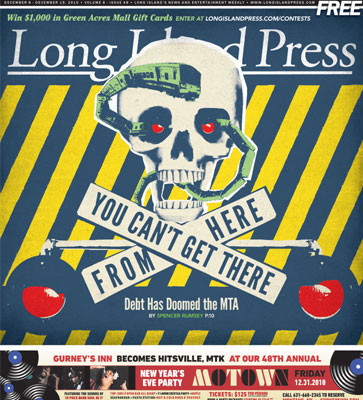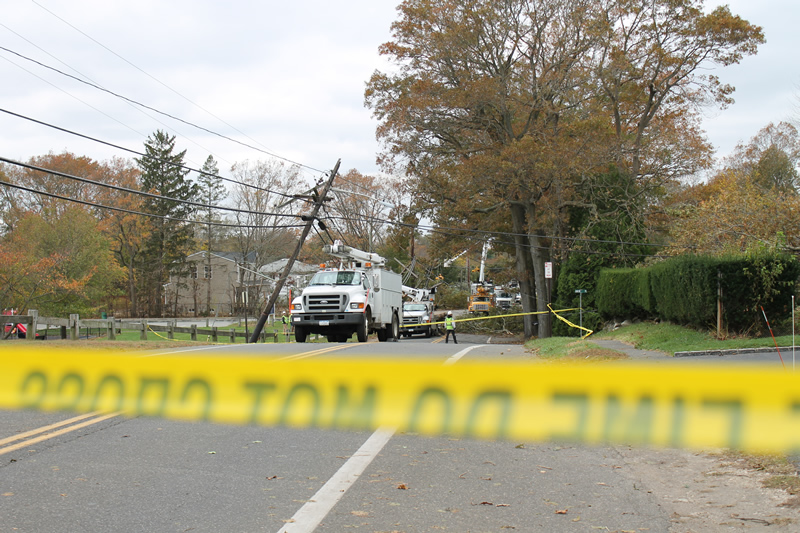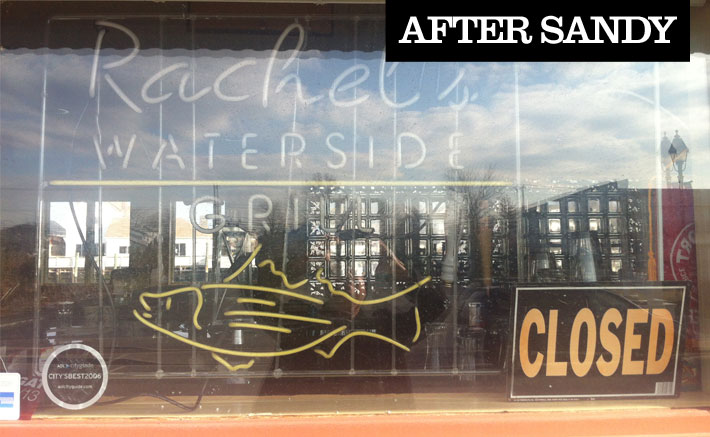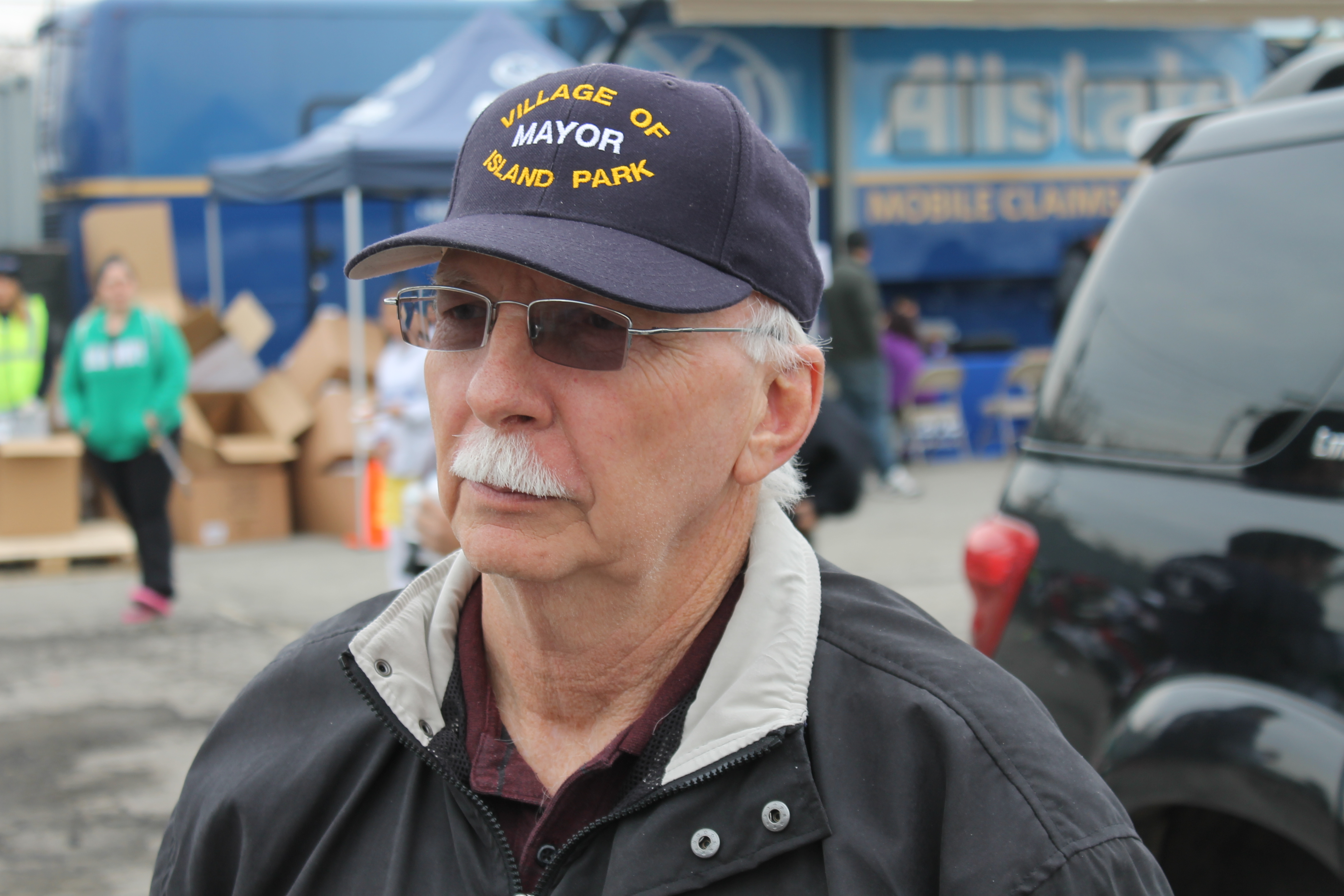
ALL ABOARD
At this fall’s only gubernatorial debate, held at Hofstra University, the one thing the candidates seemed to agree on was that the MTA made an easy target. Carl Paladino, who ran on the Conservative and Republican party lines, said it’s “one big beast that keeps sucking up money!” The Green Party’s Howie Hawkins said it was “an ATM for big banks.” Kristin Davis, the former madam, called it a “patronage pimp.” Cuomo, however, did not label the authority anything; he simply said that he would “put the governor in charge.”
Well, he will be soon enough, but there’s some disagreement on what he’ll actually do to solve our transit problems.
“Governor Cuomo is no friend of public transportation,” says Chris Natale, head of the Brotherhood of Railroad Signalmen, an LIRR union. “He’s not going to be good for us. He’s not going to be good for anything down here.”
Bridges like the Tappan Zee and the Kosciuszko on the Brooklyn-Queens Expressway “are at the end of their useful lives and must be replaced in the near future,” Ravitch wrote in his recent report on New York’s infrastructure woes. Just the Tappan Zee project alone would cost an estimated $16-billion project. And of course more MTA money has to be poured into the five-year capital program.
Albany had a chance to come up with some new revenue streams like the East River bridge tolls but Assembly Speaker Sheldon Silver shot it down, the same fate that befell congestion pricing, a traffic-management plan already used in London, Stockholm and Singapore, and championed by Mayor Michael Bloomberg.
As the Great Recession deepened, the city’s real estate industry got hammered. Revenue from the mortgage recording tax and the real property transfer tax fell from $1.2 billion annually to about $350 million. Last December the New York State Legislature cut $143 million from money already appropriated to the MTA, and took back $16 million more this September. Sharing the pain sounds good on paper but the political landscape can be very unforgiving.
A case in point is the MTA payroll tax, which was projected to bring in $1.5 billion but has fallen $300 million short.
The controversial bill that created the tax easily cleared the Assembly in 2009 but barely made it through the Senate thanks to two suburban Democrats, Brian Foley of Blue Point and Craig Johnson of Port Washington. Both Long Islanders paid dearly for their anguished votes as their opponents’ campaigns this fall made clear. Johnson’s is appealing his lost ballot battle with Mineola Mayor Jack Martins, but Foley’s defeat came swiftly.
“The Republicans did a very good job in making the rest of Long Island forget that there was a mass transit system−and how dare you tax businesses for mass transit when nobody uses it!” says Foley’s top aide, Jim LaCarrubba, recalling the pressure the new senator was under within weeks after taking office in 2009. “Everybody knew [the MTA’s fiscal situation] was a mess. It wasn’t a secret then, it still isn’t.”
He cited the state comptroller’s reports about overtime abuses, cost overruns, redundant management positions, duplicate call centers, high pensions and restrictive work rules, to name a few. (Results of a forensic audit of the MTA is due out very soon, a spokesman for the comptroller’s office said.) Given the state Senate Republicans’ refusal to “help with anything, and I mean anything,” LaCarrubba exclaimed of that legislative session when the GOP was in the minority, Foley decided that public policy in the Empire State was better served by passing the MTA payroll tax rather than letting “the largest transportation entity in the world face bankruptcy, severe service cuts, 35-50 percent fare increases.”
If the MTA, and by extension, the LIRR (and the Long Island Bus, too) ever ground to a halt, LaCarrubba said, “You’d turn the Expressway into a bigger parking lot than it already is. And then you’re affecting Suffolk County residents. How do they get to work? Because then everybody who’s been driving north and south to the train stations aren’t driving there anymore because it’s not affordable for them to take mass transit.”
A good working transportation system provides far ranging benefits to our region, experts say. For one thing, according to an unreleased study done in 2007 by Long Island Association economist Pearl Kamer, a third of Nassau residents commuted to jobs in New York City, principally Manhattan, and accounted for more than 40 percent of the Long Islanders’ aggregate income. That economic clout translates into real estate.
Tri-State Transportation Campaign’s Ryan Lynch says, “Our property values are directly tied to having a good, quick ride into Manhattan, the job center of the region. The way we can get around Long Island in a car is because we have a really big transit system. It takes hundreds of thousands of cars off the road.”
“If you have a good mass transit system,” Koppelman tells the Press, “then you don’t have to put the same amount of money into furthering highway construction. Right now, if you’re an automobile driver, you’re heavily subsidized, particularly by the federal government. But, of course, no automobile driver thinks he’s being subsidized! He says, ‘Oh, I pay gasoline and license-plate taxes—that covers everything! Well, that’s not true.”
The LIRR dates back to 1834, when nobody dreamed it would someday become the largest commuter rail service in the U.S. Some hear echoes today of the challenges Americans had to overcome in the 19th century when making “internal improvements” to our infrastructure, like paying for new bridges and roads, was a divisive issue. But where would we be without their foresight?
As Pennsylvania Gov. Ed Rendell recently told The New Yorker, “We used to be a country that built things. And not just infrastructure…This whole mania that’s gripped the body politic and the public in the last 25 years: it’s wrong for government to spend, we don’t want to borrow, we’ll borrow ourselves into debt, we’re going to leave our children and children’s children with debt. Instead, we’re going to leave our children with roads that are so congested nobody’s going to get anywhere, with a light-rail system that’s a joke, with airports that are clogged and increasingly dangerous, with bridges that fall down. That’s what we want to leave our children?”






